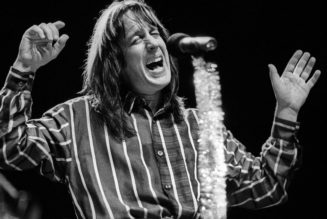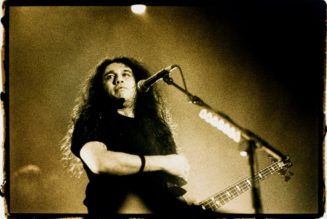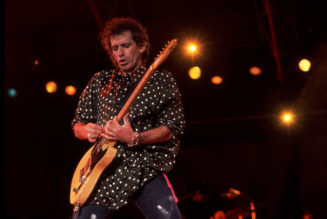This article originally appeared in SPIN in October 2006
It’s just past 2 A.M. some-where outside Detroit, and the tension on Panic! At the Disco’s tour bus would send the most devoted groupie scurrying. “I hate Jon,” ruminative guitarist and co-songwriter Ryan Ross quietly announces, referring to bassist Jon Walker. “I’ve never felt it this much.” As if on cue, Walker emerges from the bunk area into the front of the bus, where the rest of the band, plus some crew, are sitting, listening to Ross’ lament. With a mischievous smirk, the newest member deliberately inflames the situation. “I lost a ten-dollar bill in here,” he says, scanning the plush couches and snack-strewn kitchenette. That would be ten of the 1,400 bucks he has just won in C-Lo, a street dice game that the band members play nearly every night. Only 45 minutes earlier, 1,000 of those dollars had belonged to Ross. After a dramatic pause, everyone bursts into raucous laughter—except Ross, who mumbles pitifully, “I used to feel like I could win.”
Of course, Panic! At the Disco have been winning a lot during the past year. Although the band’s original members, none older than 20, grew up in Las Vegas, they had never gambled before their merch guy introduced them to C-Lo. That they’re now obsessed with a game of chance makes sense—Panic! have had remarkable luck in their short career. Gambling aside, they’re an uncorrupted, if precociously professional, bunch: Singer/guitarist Brendon Urie, 19, is the charismatic heartthrob and the rebellious son of Mormons; Spencer Smith, 19, congenial but reserved offstage, explodes in concert with his arm-flailing drumming; Ross, 20, agonizes over the band’s grandiloquent lyrics, handles business like a seasoned exec, and spends a good deal of time before shows painting his face with intricate images like bats flying out of trees; 20-year-old Walker, wry and observant, joined in May after the band met a rare stumbling block when original bassist Brent Wilson, apparently overwhelmed by the pressure of huge success, was kicked out, according to the band, after he began skipping rehearsals and ignoring phone calls. Wilson has suggested he’d been booted so he wouldn’t have to be paid his share of the current tour’s profits, and is now suing for 25 percent of royalties from the band’s platinum-selling debut album (the others charge he never played a note on the record).
Formed in high school, Panic! started out as a group of wide-eyed kids covering blink-182 songs. Their meteoric ascent began in fall 2004, when they posted the only two songs they’d written (“Nails for Breakfast, Tacks for Snacks” and “Time to Dance”) on the LiveJournal page of Fall Out Boy’s Pete Wentz. Wentz, wowed by the songs, flew to Vegas and heard the band play a short acoustic set in their practice space. He immediately offered them a deal with Decaydance—a label he’d just started in partnership with indie Fueled by Ramen—and they became his first signing. Panic! had yet to play a live gig.
The band spent the next four months writing their album, the following five weeks recording it, and then set off on the Nintendo Fusion tour. Released in September ’05, A Fever You Can’t Sweat Out—a startlingly sophisticated mash-up of dance rock, cabaret, and emo—sold a million copies by the following July. The lead single, “I Write Sins Not Tragedies,” cracked the Top 10, and the video was enthusiastically picked up by MTV, earning the band five Video Music Awards nominations. Theatrical and zany, the clip depicts a doomed couple’s wedding ceremony that’s crashed by the stilt-walking, fire-breathing, unicycling Lucent Dossier Vaudeville Cirque. Urie plays a top-hatted dandy who saves the groom from getting hitched to a “whore.” It’s a breakup lament taken to a new emo apex—the relationship is dramatically over before it really even begins. This winter, with opening act Bloc Party, Panic! will headline their first arena tour. At this rate, they’ll be rolling dice in the aisle of their own private jet before most of their friends have chosen their majors.
Flying so high has made Panic! an easy target. “A lot of people either really loved our band or completely hated us before our record was even written,” Ross explains, “just by the way we’d gotten signed.” His intensely self-aware yet playful lyrics—like “We’re just a wet dream for the Web zines” from “London Beckoned Songs About Money Written by Machines”—were being composed as message boards lit up with opinions of the band. Panic! didn’t know it, but that was just the start. Not only were fans lumping them in with fellow emo phenoms Fall Out Boy, for better or worse, but so was Killers frontman—and FOB hater—Brandon Flowers, who in an interview called Panic!, and emo in general, “dangerous.” (Flowers later apologized, admitting that he sometimes gets “jealous” and that he’d never even heard the band.)
“They were probably the greenest band I had ever met,” says Wentz, recalling the days when he was hanging out with them in Los Angeles (even lounging in a hot tub, he claims). “But it would be misleading if I said I was an Obi-Wan for them. They march to their own beat. I watched them turn from deer-in-headlights to headlights going after the deer.”
When I met Panic! in July, they’d been on tour (with the Dresden Dolls and the Hush Sound) for a little less than two months, which was plenty of time to establish the familiarity, in-jokes, and nonstop, lowest-common-denominator humor that sustains young bands facing a world so large it can only seem absurd.
JULY 11 CINCINNATI
“Fall Out Boy!” A scrubby college-age guy leaning out a car’s passenger-side window is taunting the fidgety Panic! At the Disco fans who form a line that runs the length of the block outside Bogart’s, the club where Panic! are playing tonight. The University of Cincinnati campus is only a short walk away, and the quaint but fairly run-down strip that’s anchored by the 1,500- capacity venue features student-friendly hangouts like Sudsy Malone’s, a combination Laundromat and bar. Still, few of the kids milling around on the sidewalk appear to be past SAT-taking age. (Later, at the meet-and-greet, a girl with braces named Caroline, seemingly acting on a dare, asks Urie if Ross is a “good kisser.”)
The band is gathered on the bus, experiencing life as a rock star the way so many young groups do these days: by playing video games. Smith is in the tiny, couch-lined back lounge, challenged by the PlayStation game that’s everyone’s current obsession: Guitar Hero. (The floor pad they needed for Dance Dance Revolution wouldn’t fit.) He stands before a mirrored wall, facing a flat-screen TV, a small, plastic replica of a guitar strapped to his chest. He furiously presses buttons on the neck and strums a paddle that stands in for strings. “This one’s fucking tough,” he murmurs, stumbling through “Stellar,” an Incubus song with a woozy lead riff. The drummer scores low. “That’s a pretty big bum-out.” (He redeems himself on Hendrix’s “Spanish Castle Magic.”) His girlfriend of eight months, Haley, isn’t present, but later she shrugs when she says that being on tour “isn’t as crazy as everyone thinks.” She is 17 and lives in Lewistown, Illinois—population 2,500.
Meanwhile, Office Space plays up front on the TV perched above the driver’s seat. Urie takes a break from canoodling with Brittany—a petite, pretty high schooler (a “good friend,” he tells me later, but not a girlfriend) who is traveling with the band for a week—to watch the movie’s title sequence, in which the “Michael Bolton” character raps along to Scarface’s “No Tears,” then locks his door when a black guy approaches. Urie laughs so hard that if he’d been drinking one of the Capri Sun Surfer Coolers that the band prefers, it would’ve come out his nose. Later, as Ross paints a gnarled tree on his face in the bathroom, Walker puts on a compilation of Guns N’ Roses videos to “get psyched.” He is drinking whiskey out of a plastic cup. “It warms up my throat,” he says. “Although I don’t sing.” Walker is the only one in the band who imbibes. This is Panic! At the Disco: honest-to-God screaming-fans-and-astounding-sales rock stars who poke a straw into a pouch to have a drink and are even known to tidy up after themselves on the bus.
Suddenly, a member of the crew pops inside to tell everyone that the Dresden Dolls finished their set early, and please, hurry up. The venue’s dressing room is a cramped, windowless concrete box. Inside are four large wardrobes containing the band’s outfits and a table crowded with food and Panic!’s sole stimulant: Red Bull. Urie’s warm-up routine consists of stalking around the room, headphones on, shrieking his scales and occasionally screaming along to whatever his iPod turns up. Third Eye Blind’s “Wounded” inspires a particularly spirited rendition.
Not counting the crew, who are also coming in and out, there are eight people other than the band stripping down, suiting up, shouting jokes, and slapping on makeup. These include three members of Lucent Dossier (two women and a man), one of whom scurries into the room wearing only fishnets and a top, and the auxiliary band members—Bartram Nason, who gets in some practice on his cello, and keyboardist Eric Ronick. (They will be joined later in the tour by a couple of stylists.) In this writhing, semi-clothed crowd, you can instantly identify the members of Panic! by their brightly colored boxer briefs, all the same brand.
Bogart’s might as well be the inside of a boiler. After the set (which Urie claims was his “hardest show ever”), the band members come shuffling into the dressing room, their ruffled shirts completely soaked through. Even in his exhaustion, Urie maintains center stage, sprawling on the floor, where everyone has to step over him. Brittany sets the hair dryer to “cool” and waves it like a wand over his body; one of the Lucent Dossier women drips bottled water onto his forehead. After a shower, it’s too hot to slide back in his skintight jeans, so Urie wears a small towel around his waist as he walks through the parking lot to the bus. The 50 or so fans waiting for autographs outside cheer and hoot.
JULY 12, CLEVELAND
Before any of the other band members are awake—at about 12:45 P.M.—Urie stands outside the bus, in the early afternoon mist, locked in a long embrace with Brittany, as a driver waits to take her to the airport. We’re parked behind the Plain Dealer Pavilion, an outdoor amphitheater shaded by what looks like a series of gigantic white umbrellas. It holds four times as many people as Bogart’s, many of them in seats. The Cuyahoga River—chocolate brown, as if it were flowing out of Willy Wonka’s factory-runs directly behind the stage.
Today, Smith and Ross have a conference call with their manager, and Urie and Walker will be interviewed for a satellite radio program. Told that they’ll also be acting as guest DJs, Urie heads to the dressing room and fires up iTunes on his gleaming MacBook Pro. Though he’s currently listening to ethereal harpist Joanna Newsom and atmospheric British electro singer Imogen Heap, he spends the next hour on a whirlwind tour of ’90s hit singles: “Blackstreet, dude!”; “Wow, Color Me Badd!” He wriggles furiously to Britney’s “I’m a Slave 4 U,” plays Hanson’s “MMMBop” almost in its entirety, and searches for Better Than Ezra and Marcy Playground. Only a particularly saccharine song by Hawthorne Heights earns any scorn. “Turn that off right now,” scolds Ross, who has just entered sporting box-fresh sneakers—Pharrell Williams’ Ice Cream brand.
Later, Urie and Walker squeeze into a Mini Cooper that ferries them to the radio interview, which will be conducted by a gregarious, middle-aged guy in an LCD Soundsystem T-shirt. After the two punchy bandmates give casual answers to awkwardly posed questions—like “How many ruffled shirts do you own?”—the host quickly wraps up the chat, only to discover that they’ve got 15 minutes remaining. During those last minutes, there’s some low-level hijinks—Urie whispering, subliminal-style, “Jesus isn’t real”—but no one seems to mind. Later, a complaint about their behavior reaches the band’s manager. The guys don’t think they’ve done anything wrong, but Walker is concerned about what Ross and Smith will think. “Should we do more serious interviews?” he asks sincerely. Urie anxiously dissects the incident over and over for anyone who will listen.
Still, it’s a good day. The keyboardist meets a young hostess at a restaurant behind the venue who comes back to the dressing room and gives him a haircut. The mother of a girl celebrating her birthday picks up the band’s lunch tab. Only Smith misses out—he and Haley are elsewhere. And on behalf of the band, Ross fields an offer from a modeling agency. “How much? I’ll be a pretty boy for money,” Urie blurts. He’s only half joking. MAC Cosmetics has already offered to set up the band with a steady supply of products.
JULY 13, GRAND RAPIDS, MICHIGAN
“If we were in Denver, we could do something,” says Smith to his girlfriend. Hiking? she asks.
“No, go to the mall.”
For this stop, Panic! have been upgraded to the DeltaPlex, a massive, featureless arena with a gray parking lot stretching away from both sides of the building. Walker and Urie break out their skateboards and go carving across the glassy concrete floors, practicing kick flips. The heat is unbearable—there’s no shade anywhere. But as always, the fans wait outside, at least one since 3:30 this morning.
Later, in the dressing room, there’s the usual mayhem, which soon turns into rigorous, ordered showmanship. After chest bumps with their tour manager, an imposing stack of muscle, the band moves briskly into place, and 5,000 vocal cords unleash a noise like you’ve never heard in a horror movie, a streaming together of efflorescent sex and celebrity obsession that’s palpably intimidating.
To harness that wave of energy, to send it curling back into the crowd, Panic! At the Disco give these kids what they, on a primal level, most expect—the album’s first song. And they largely maintain the album’s sequence throughout. Many of these fans are likely seeing their first show, and the band works to bring to the stage what the kids know from their bedrooms. The visuals link back to MTV, not to mention the band’s Las Vegas upbringing. It’s a casino-showroom-style spectacle. In addition to Lucent Dossier weaving in madcap sketches—Urie gets a lap dance during “But It’s Better If You Do”—there’s a lit-up sign announcing the band’s name, a mustachioed hanging moon, and a large windmill festooned with Christmas lights, plus the band’s own Moulin Rouge–inspired costumes.
In the center of all this, Panic! play hard and loud—only their covers of Radiohead’s “Karma Police” and Smashing Pumpkins’ “Tonight, Tonight” come off as bombastic. And with only 11 songs of their own, the performance is a bit short at one hour, especially since that includes a costume-change intermission. But it suits the young crowd-surfers just fine.
Later, Panic! come out, two at a time, accompanied by their security guy, who leads them along the metal barricade that kids are leaning over, waving tickets, shoes, shirts. Dazed by camera flashes, Urie does his best to sign everything in sight and acknowledge the professions of undying love.
“There was a ton of people who only wanted Brendon’s autograph,” a slighted Walker grumbles later that night. But before long, the two are locked in a spirited, brotherly bout of roughhousing. The C-Lo game will soon be on.
TWO WEEKS AFTER I leave the tour, Panic! At the Disco’s stratospheric adventure snaps back to earth. Ryan Ross’ father, George, has passed away unexpectedly at age 60. “I grew up living with my dad,” Ross told me soon after we met. “My parents got divorced when I was really young.” He didn’t always get along with his father, a former Marine who served in Vietnam and strongly disapproved when his son dropped out of college after a semester to play music.
His father was also an alcoholic, and Ross, who has never had a drink, wound up caring for him as he was shuttled in and out of the hospital during the months Panic! wrote their album. Ross’ frustrations found their way onto A Fever That You Can’t Sweat Out, in the songs “Nails for Breakfast, Tacks for Snacks” and “Camisado,” with lyrics like “This is the scent of quarantine wings in a hospital / It’s not so pleasant / And it’s not so conventional / It sure as hell ain’t normal.”
Ross’ mother was more of a “hippie” when she was younger and always supported Ryan’s efforts to be a musician. She’s now remarried and has another son; Ross speaks to her about once every two months. “My mom moves around a lot,” he explained. “We get along just fine when we see each other, but we don’t keep in touch that much.”
He will be surrounded by his family of bandmates for the foreseeable future. Not long after Ross’ father’s funeral, Panic! resumed their ambitious schedule: posing for Spin’s cover, playing Lollapalooza, and attending the VMAs. They will soon begin work on their next album. Urie has already been composing on his laptop, experimenting with virtual glockenspiel, cello, and harp. Ross is also moving ahead. “This record will not be so extremely personal in a literal way,” he said. “I won’t just be about me. I want it to be a lot more universal.”














